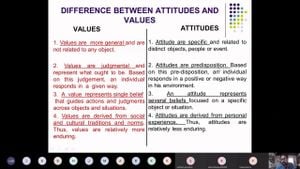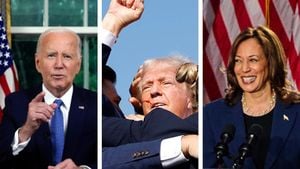Percival Everett, the celebrated author known for his unique storytelling and sharp wit, has clinched the prestigious National Book Award for Fiction, awarded on November 20, 2024, for his novel James. This novel presents a fresh perspective on one of the cornerstone works of American literature, Mark Twain's The Adventures of Huckleberry Finn, by retelling the story from the viewpoint of Jim, the enslaved character who accompanies Huck on his travels.
Upon receiving the award, which came with a $10,000 prize, Everett reflected on the tumultuous times leading up to the ceremony—specifically referencing the recent presidential election results. "Two weeks ago, I was feeling pretty low, and to tell you the truth, I still feel pretty low," Everett expressed. Yet he found solace and hope amid the gathering, saying, "as I look out at this, so much excitement about books, I have to say, I do feel some hope, but it’s important to recognize hope really is no substitute for strategy." This poignant remark encapsulates not only Everett's emotional state but also the broader sentiments felt across the literary community during challenging times.
The 75th National Book Awards ceremony took place at Cipriani Wall Street, drawing about 800 attendees to celebrate literary excellence. Actress and comedian Kate McKinnon hosted the event and cleverly critiqued artificial intelligence right from the start of her monologue. She remarked humorously, "A book is an offering. It's a hand in the darkness, a way of saying 'I know, isn’t this crazy?' And that's something a robot will never be able to do." McKinnon's light-hearted tone provided relief amid some serious messages conveyed by other authors during their speeches.
Everett's James received wide acclaim from critics prior to winning the award, with one notable review from Dwight Garner of The New York Times calling it "a tangled and subversive homage, a labor of rough love". His novel not only pays homage to Twain's classic but also rewrites the narrative of history, delving deeply and humorously—a style characteristic of Everett's long and prolific writing career. This touching retelling allows readers to explore themes of race, identity, and the quest for freedom from Jim’s perspective, offering fresh insight on well-trodden literary ground.
Alongside Everett, the nonfiction award went to anthropologist Jason De León for his compelling exploration of migration and human smuggling titled Soldiers and Kings: Survival and Hope in the World of Human Smuggling. De León dedicated his award to "everyone on the migrant trail," emphasizing the humanity behind the statistics often reported about migration. He used his platform to address the urgency of immigration reform, directly critiquing the incoming administration's stances with statements opposing the impending dystopia painted by right-wing policies.
Lena Khalaf Tuffaha secured the poetry award with her collection Something About Living, which poignantly highlights Palestinian history and the diaspora experience. Tuffaha, during her acceptance speech, focused on the importance of representation and the painful legacy of colonization, remarking on the need for literature to confront uncomfortable truths. "We are now living in the second November of the American-funded genocide in Palestine," she stated, calling for activism against the violence faced by civilians.
The award for translated literature was bestowed upon Yáng Shuāng-zǐ and her translator Lin King for their work Taiwan Travelogue, which intricately explores the themes of translation and identity through the lens of Japanese and Taiwanese narratives. Similarly, Shifa Saltagi Safadi was awarded the Young People's Literature category for her coming-of-age story, Kareem Between, which portrays the life of a Syrian American boy grappling with displacement amid controversial political climates.
The awards ceremony reflected not only literary talent but the power of literature as a medium for social commentary. Moving speeches and wins highlighted the shifting dynamics within American society—especially concerning issues like censorship, immigration reform, and historical injustices. Ruth Dickey, the executive director of the National Book Foundation, invoked words from Ursula K. Le Guin, stating, "Hard times are coming," which hinted at the challenges literature—and the authors—face as they navigate turbulent political waters.
This year, the National Book Awards processed 1,917 submissions, showcasing the immense talent within literary circles and the desire for stories to resonate with readers. The judges faced tough competition, but the winners' voices echoed the importance of engaging with contemporary issues through the written word—a reminder of literature's enduring relevance.
Previous accolades of the National Book Awards are impressive and historically significant, with past winners including giants like William Faulkner and Toni Morrison, and this year’s ceremony honored Barbara Kingsolver with the Distinguished Contribution to American Letters Award. Kingsolver's acceptance speech centered around literature as a force for societal change and moral questioning, stating, "We’re at our best when we’re disruptors, when we rattle self-absorption." Her sentiments align with the essence of what the National Book Awards embody—a celebration of those who challenge, inspire, and provoke thought through storytelling.
Everett’s victory with James is emblematic of the growing recognition of diverse voices reshaping literary narratives. Throughout his career, the author has consistently explored themes of race and identity through inventive plots and memorable characters, making his award not just about the novel’s merit but about creating pathways for underrepresented narratives. With the future of narrative exploration at stake and voices like Everett’s pushing boundaries, the literary world is not just alive, but vibrantly engaged with the world around it.



